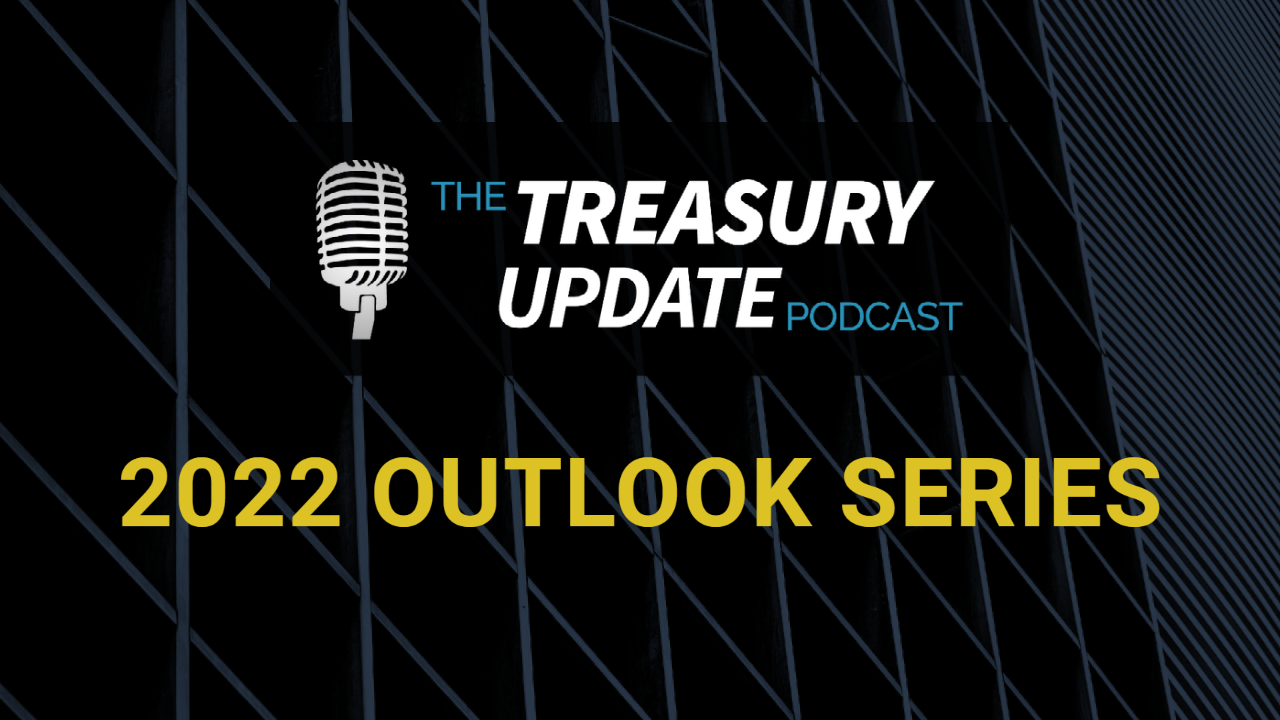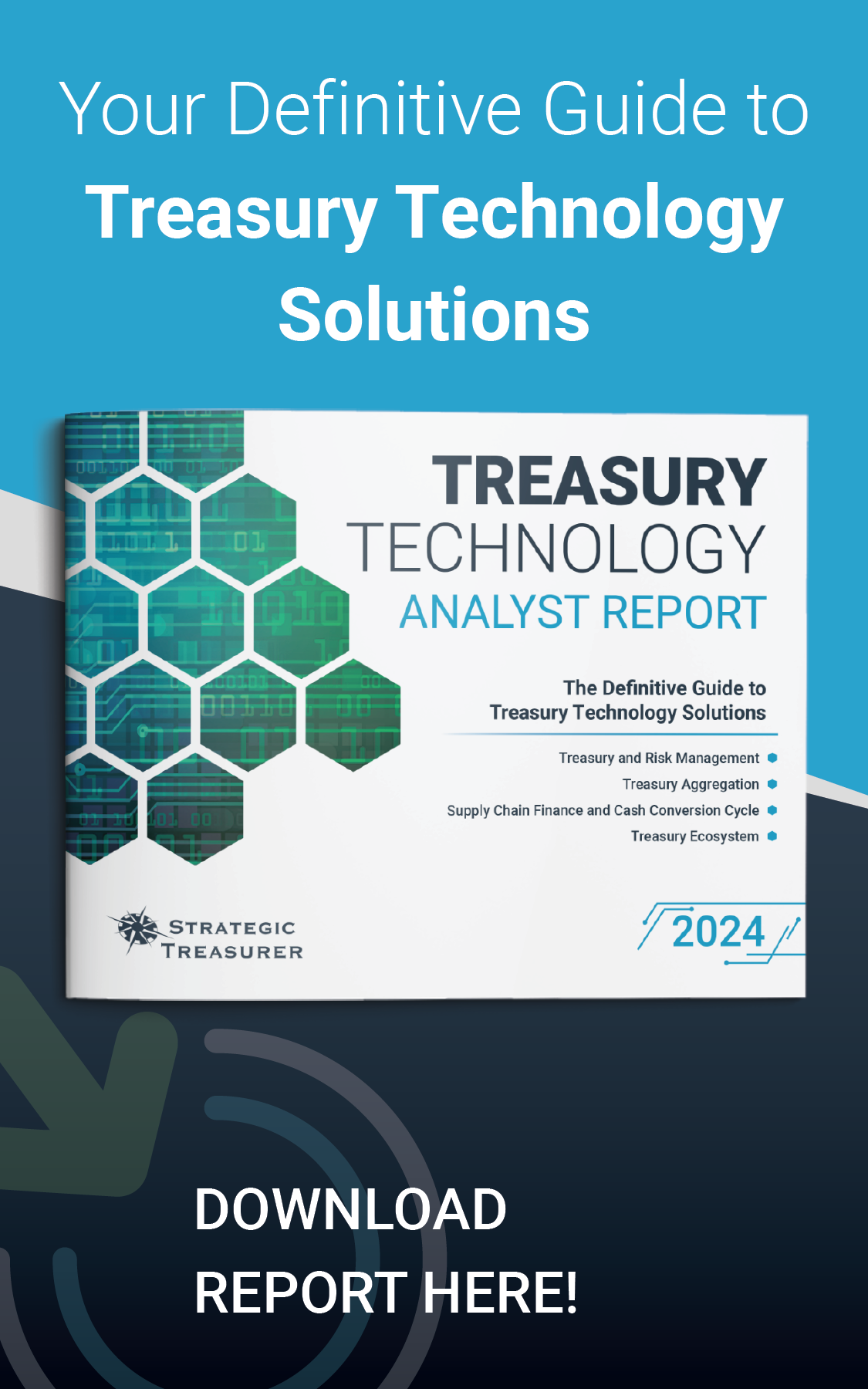
Episode 184
2022 Outlook Series: Quantum Computing
On this episode of the 2022 Outlook series, Host Craig Jeffery joins Royston Da Costa, Assistant Group Treasurer at Ferguson plc, to discuss the outlook of quantum computing. They explore this developing technology, discuss how it’s relevant to finance and treasury, reveal which companies are using it now and its impact on cybersecurity. Listen in to the conversation to find out more.
Host:
Craig Jeffery, Strategic Treasurer


Speaker:
Royston Da Costa, Ferguson plc


Episode Transcription - Episode 184 : 2022 Outlook Series: Quantum Computing
Announcer 00:05
Welcome to the Treasury Update Podcast presented by Strategic Treasure, your source for interesting treasury news, analysis, and insights in your car at the gym, or wherever you decide to tune in. On this episode of the 2022 Outlook Series, host Craig Jeffery joins Royston Da Costa, assistant group treasurer at Ferguson to discuss the outlook of quantum computing. They explore this developing technology, discuss how it’s relevant to finance and Treasury, reveal which companies are using it now, and its impact on cybersecurity. Listen into this important discussion to find out more.
Craig Jeffery 00:59
Royston, welcome to the Treasury Update Podcast.
Royston Da Costa 01:02
Hi, Craig, good to meet you again, be albeit virtually,
Craig Jeffery 01:06
you know, I think the last time we did a podcast was that about a year ago?
Royston Da Costa 01:10
About a year ago. Absolutely.
Craig Jeffery 01:11
I love talking technology with you what your thoughts are what’s going on. And as we jump into this 2022 outlook series, our title is Quantum Computing. And, you know, it sort of sounds like science fiction in some regards. But it’s also perhaps more real than we thought. And maybe you could start off by describing quantum computing, what is it at least you know, conceptually, just broadly,
Royston Da Costa 01:37
To be honest with you, great, I’ve always maintained I’m not a IT specialist, or a technology specialist for that matter. But clearly, we can’t ignore technology is a part of everyone’s life today, whether you’ve got an iPhone, or smartphone, or whether you say, you happen to be, you know, sort of using Python for programming, AI or machine learning. But quantum technology really came to my attention, probably about a year and a half, possibly two years ago. It’s not something new in many ways. You think about technology, actually, a lot of it’s been around for a long time, but it’s become more mainstream and no surprises that the Chinese have been working on this technology for a good decade or so. And what really interested me is the the description, it has a one of its uses is the unhackable internet. But there’s so much more to quantum computing. So I’ve tried to answer your question. First by saying the power of quantum computing is a bit like when you look at your, what your classical computers can do today, if you look or are trying to identify specific grain of sand, your classical computer will look at every grain of sand individually to find that specific grain. What the quantum computer can do, they will look at all of the grains, simultaneously to find the ones you’re looking for immediately. So there you can see, already there’s a question that there’s no, there’s a benefit of speed. And obviously accuracy goes with that. But we’re on how on earth is that going to benefit Treasury right? So we’ll go to you know, sort of cut to the chase on this. For me, it’s simply, we in Treasury, are constantly working with solutions. And you look at what’s happening in the payments space with the open banking API’s. We’re looking for speed, we’re looking for transparency, looking for accuracy, we’re looking for efficiencies in all of our processes. But here’s the interesting part. If you look at what the impact the pandemic has had on a lot of corporates and treasury, it’s around cash flow forecasting. And that age old issue has been around for years, you look ask any corporate treasurer, they’re always going to say that’s in the top three top five priorities. And no surprise again, cash flow forecasting has been become a very popular topic as we came up with pandemic. So some of that quantum computing, I can see lending itself to a solution that enables corporates to interrogate and harness vast amounts of data, but in a fraction of the time that they would have traditionally perhaps taken to look at it. And just one last point to mention when if you were to ask me, or when do you see this coming in? Well, actually, it’s already in. It’s just that not many people, including myself, have actually seen it and you might not even recognize it’s in because perhaps the solution that you’re looking at or you’ve been been using, doesn’t necessarily tell you that. So I’ll give an example. I came across a company called AlgoDynamix, who Cambridge University initiated venture. And they use quantum computing to forecast FX rates. And they’ve been around for a year or so perhaps two years. Now obviously, that’s a different topic altogether, a new client want to look them up and see exactly what they have to offer. But that’s an amazing kind of a to be using technology already, but be in terms of what it has to offer. But you can see it probably a myriad of situations within not just treasury, but within why society with this sort of technology could be very powerful and very useful.
Craig Jeffery 01:38
Great intro and explanation of some people using it. I did want to ask a little bit more about quantum computing. And maybe I’ll just talk through a few of the other areas. Is this a step change? Is this a continuation of what we’re seeing in technology where we break components of systems down smaller and smaller, which allows us to go faster? Doesn’t seem to be the case on this. Is it an extension of speed of processing? So we have things in business intelligence, where there’s in memory capabilities, where you load millions, tens of millions, hundreds of millions of records in memory at once? And so the BI tools can process that almost at the same time. And there’s, there’s obviously upper limits on that, but they’re pretty massive, especially with scale. Is the ability to compute, is this just the next level of compute? It’s not really just about memory, but it’s the ability to process more data more quickly? I mean, how would you describe that as a, you know, on this path of, we can scale more rapidly compute more quickly do more things?
Royston Da Costa 06:32
Yeah, I mean, I’ll try a bit. As I said, I’m not one of these technical specialists that could kind of do this question any justice. But I mean, based on what I’ve read on the subject, with normal computers, you’re dealing with bits, basically basic units of information that have two possible states, namely, one or zero.
Craig Jeffery 06:55
On or off. Yeah.
Royston Da Costa 06:56
Yeah. Quantum computers deal with qubits, which also known as quantum bits. And those can be one, a zero, or both one and zero, at the same time, also referred to as a quantum superposition. By I guess, the mere fact that you can have that type of scenario, multiple qubits allow for the creation of entangled states. And this is where you get into the security aspect of how it’s virtually impossible to hack messages that are sent using quantum technology or quantum internet, as they call it. Because you don’t know what both or it’s kind of the various parts of the message and we try to get you get one part per message, then the other part is meaningless, because it will, it will just be, so it will just corrupt. But there’s something else that I think it’s worth also mentioning in terms of quantum computing. And that’s kind of the challenge there. Although companies like Google and IBM and Microsoft already have, you know, are using them, it’s quite difficult to kind of have a more mainstream concept would be like, for likes of you or me, for example, in in terms of, you know, having a device you’re using it, so if on your person. And the reason is because it is incredibly sensitive to interference. And what that means effectively, that they have to be kept isolated from all forms of electrical interference, and you wait for it, and chill down close to absolute zero.
Craig Jeffery 08:36
That’s colder than your refrigerator.
Royston Da Costa 08:39
Cold enough as outer space. So I think there’s a bit more time to go but not to say that, you know, for IBM, Microsoft, Google are all kind of racing to kind of develop this technology. And China’s already been doing this for four years and investing billions in it. On it rather, just one last thing to mention in terms of the history behind this. So apparently, it was in 1998, that either chain of the LA sorry, Los Alamos National Laboratory and Neil Gershenfield of Massachusettes, MIT, basically, and Mark Cuban it called the University of California Berkeley create the first quantum computer. So could ask you guys who came up with the, this technology in its in its current form from its origins. So it’s, again, not getting to obsess about the fact that it’s quantum computing. And I’ve heard the term before, you know, when you think of the futuristic sci fi films that we may have watched growing up the speed, actually, you can see that happening in any in every area of life that we’re dealing with, if you’re looking at, you know, sort of autonomous vehicles about sustainability and you know, sort of how electric cars have evolved. You know, there’s an element of urgency in some of these industries and in some is that there was a lie. But then you’ve got the cyber fraud challenge, which affects clearly everyone, especially in terms of Treasury. So a technology like this where hopefully there’s there’s hope that there’s a possibility of improving how the security around our transactions and certainly interacting with banks, then absolutely, I’d be very interested to see more on this and take advantage as much as possible what what has to offer,
Craig Jeffery 10:29
As we talk a little bit more on the the applications to finance and treasury, you mentioned just mentioned security, you talked about forecasts a little bit before, you know, when you say unhackable, so this is, this might allow us to move past some of it. I mean, criminals are very creative. And I can picture them saying, Well, how do I use quantum computing to hack the unhackable and figure out ways, ways around it? But what does that going to mean for payment processes? As should we be thinking about this type of impact on fraud and security and defenses? You know, in context of what we need to do today too.
Royston Da Costa 11:07
Nothing’s ever guaranteed in life, we all know that. So we can never say although it says unhackable communication method, I’m sure there’s always going to be someone someday that will come up with a way of how they can can hack it. I mean, just as it did with the cryptocurrency, right. But you have to also think about the fact that at the moment, we’re probably at the bottom end of the spectrum, and in many ways regarding cyber fraud. You know, I was on a panel session yesterday, you know, finance, talking about this very topic, cyber fraud, and how, you know, some of the experts in the industry are from banks, and from corporates talking about how we’re kind of at the moment behind the curveballs we’re trying to keep up, we’re not even keeping pace with the cyber criminals. So we’re looking at from that perspective, anything that can potentially improve, where we are from where, take us from where we are, to where we could be, is going to be better. The fact that we will probably help be one step ahead of the criminal, I don’t know maybe will one day, but certainly the moments in time to see that. The important thing they will say Craig is in terms of the security aspect, quantum computing is very expensive. I mean, the companies I mentioned before IBM, Microsoft group, a huge company, they have the resources to invest in this. I’ve always thought and I’ve said this before, cyclists typically will look for a bit like a stream will look for the fastest way to a target. So the more robust your processes are, the more secure you’ve you’ve made yourself. And you’ve reviewed all the loopholes and tried to protect yourself with whatever best practices that are widely available, cyber insurance and so forth, the less attractive you will be to cyber criminals. So there again, I would say, I don’t know, again, what sort of costs we’re looking at back imagine it’s quite substantial. Cybercriminals get involved in developing quantum computers, not impossible, but the return on their investment have to be fairly significant for them to gain anything out of it. And if the bank, say, for example, are using this technology to to make it more difficult for them to do that, then one would like to think, okay, there’s some hope here for us. And so finally, to answer your question, I would say that it would be a situation where when we transact with our bank, apart from the processes that we have currently around, making sure that you know, the supply details are validated and making sure your multi factor authentication, and or, you know, making sure that you’re, you’re you’re well educated in terms of the phishing scams and all those good things, that it’s a question of, really, how do we and this comes down to obviously, technical experts, putting in place that say this technology to ensure that the messages you’re sending to your bank, are completely watertight, and equally, when it gets to the payment, details of the payment information you’re sending to your beneficiary are also protected. So some way then there shouldn’t be any possibility for a third party or cyber criminal to say, in both comments hack into that message and getting into that data, as in some cases that appear to be able to do with companies today. We quite often hear that some company’s data’s been hacked,
Craig Jeffery 14:36
You know, as I listen to what what you’ve said here and you’ve described, you know, some some situations that are happening now with it. What it’ll take some of the challenges with it. It’s, it’s, it seems like if we if we try to fit this in with things like API’s, machine learning, adoption, API’s, you know, probably if you said a year of API’s that’s probably been 2021, in terms of going up the curve, or the years, it’s probably 2022 will be, you know, shifting from a certain percentage to, you know, the vast majority using that machine learning starting the, the upward curve as, as these capabilities are put on systems. And so you’re mentioning, this is the very early days of quantum computing and finance. So, I guess I guess I’m trying to, I’m asking you when, when do you think it’ll become much more common or start moving up the curve? And then really, the other question is, how do we keep on top of this, just so that we’re paying attention to it? As it becomes closer? Is it so is this is this 10 years away? Is this three years away? Like, what should we be thinking about? timewise?
Royston Da Costa 15:51
Definitely, as a corporate, I would like this to be no more than three years away, frankly, because there’s so many pain points that this could help resolve. And in terms of, you know, again, I don’t see us me, as a US as a as individual, or as a corporate treasurer, necessarily being introduced to a solution that says, Well, this is kind of quantum quantum computing behind it. And therefore, you should look at it for that reason, you know, for me, it’s more about looking at a solution and says, Well, we can we can resolve your payment pain points regarding supply details, or we can resolve your KYC issues. By kind of putting the solution in place, which is very secure, it’s kind of going to come across that way. So as you know, in terms of the AlgoDynamix, I mentioned early on, mentioned to me, a quantum computing was behind the solution, I wouldn’t even thought to ask or kind of query that. So I would definitely, my hope would be it’s sooner rather, given that it’s already been placed for a while given that the, you know, the Chinese in particular, would be developing that technology for last decade, I would like to think it’s sooner rather than later. But if you’re looking longer term, I would imagine that definitely within a decade, I can see it becoming a much more widely available technology, certainly in terms of the likes of the large companies like Amazon and Google and IBM kind of rolling out potentially products that you can do basically run off their resources, if you like, I see that happening. But like glamorous, and they’re doing at the moment of their thing for getting called service. They they kind of fire out to get to startups, and we have the Amazon to climates and services. But you know, it’s been that bad, but they see those large companies can afford to provide this type of technology will kind of, you know, sort of lease it out. If I could put it that way to the rest of the world perhaps.
Craig Jeffery 17:52
I’m just thinking about some of the things that you were saying there on the leasing it out. I think that’s, that makes a lot of sense as we move towards, you know, out of our own data centers, to the cloud to platforms as a service, and expanding that. It’s really interesting to think about that. Thanks so much for your time and talking about the outlook series and talking about quantum computing. Any final thoughts? And I know you want to talk about the metaverse, but we’re gonna have to do a separate, a separate podcast on the implications on finance and Treasury from that, but I’ll give give you the opportunity for last last thoughts.
Royston Da Costa 18:27
Thanks, great. As I said, I try to always remind myself that I work in Treasury. And every time I look at technologies, I do like what I see. And I do like getting engaged in some of these kind of developing and evolving technologies, especially when I can see there’s going to be a specific benefit to to what I do and to corporates and treasurer work. But I have to say, in the last year, I’m pretty sure this is no surprise to your listeners. The banks have come into their own, I have to say. As much as on one hand, I feel frustrated that they’re not, you know, kind of moving quickly enough, as far as I’m concerned. But on the other hand, there are certain banks that have already begun to demonstrate they’re engaged in moving forward. I think that’s so critical for banks generally across the world. Because you know, as we all know, you know, if you’re not willing to move forward, then you will be left behind, especially when it’s involves technology. And the reason I say that simply, Craig, is because when you look back to when the pandemic first struck and say from my recollection, say it was March 2020 when there was a lockdown in UK. We were actually in the process of opening some accounts and you can, up to that point, it was like digital documents, no, we don’t accept those. They have to be wet signatures. And lo Behold, the day after lock down, they were saying, Yeah, sure. We accept DocuSign, we accept Adobe Sign, which is great, which is absolutely fine. I mean No, no criticism in that, but I just thought it’s quite interesting how quickly the banks adapted and well done to them. But then moving from there, what was also interesting is five years ago, I went to some of our banking partners to talk about, banking partner in one of our fintechs, to look at a, a block, I say blockchain distributed ledger, technology based solution looking at supplier or vendor validation. And I don’t think there was much appetite, then for a reason. Some of the banks, well, it’s certainly one of those banks is now themselves. And I know you said to keep clear, but have to use an example, looking at investing in the metaverse, which, you know, as we know, Facebook, quickly branded name the Meta, but also I know, Microsoft, Google, sorry, Microsoft are looking at that. And we can talk about this in a separate session, as you say, but the point being here that when banks start to put their weight behind some of these technologies, and we’ve already seen about about the CBDCs, which is the central bank distributed cryptocurrency consortium, then you can expect to see change, and you can expect to see change moving happening quickly. So that’s for me, very encouraging, that, you know, the banks are beginning to get involved. And also the last point on that is this this, I would say stigma, but perhaps also aversion to partnering with fintechs, mainly because I guess historically, what fintechs were not a known entity frankly, they haven’t got the history of banks and so on, so forth. But I think, partly because of the way we’ve evolved with what is experts in the pandemic, but also the banks finding perhaps recognize that this is not a battle that they’re in with the fintechs. Quite the opposite. If it’s a battle, it’s a battle to partner with the fintechs so that their customers like us can get the very solutions that we’ve been screaming for, or we can go back as far as we like, but frankly, last five years.
Announcer 22:08
You’ve reached the end of another episode of the Treasury Update Podcast. Be sure to follow Strategic Treasure on LinkedIn. Just search for Strategic Treasure. This podcast is provided for informational purposes only, and statements made by Strategic Treasure LLC on this podcast are not intended as legal, business, consulting, or tax advice. For more information, visit and bookmark StrategicTreasurer.com.






